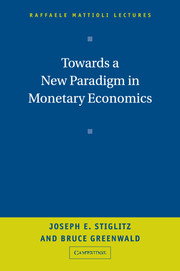Part I - The principles of the new paradigm
Published online by Cambridge University Press: 12 May 2010
Summary
Money has long played a central role in popular conceptions of economics – and life more generally. “Money makes the world go around’ and “money is the root of all evil” are but two aphorisms that come to mind.
Professional economists give money an equally mixed review. The monetarists – whose enormous popularity in the early 1980s seems subsequently to have waned – place money as a central determinant of economic activity. By contrast, in the classical dichotomy, money has no real effects, a view which has been revived in real business cycle theory. Monetary economics has thus been a curious branch of economics: At times, its central tenet seems to be that it is a subject of no interest to anyone interested in real economics; at other times, it moves front and center.
While for long periods of time the view that money does not matter has held sway in monetary theory, this does not appear to be the view of the world, which hangs on anxiously, wondering whether the Federal Reserve will raise or lower interest rates by as little as twenty-five basis points. As our starting point for this book, we recognize there is some validity in the view that money matters, at least in the short run.
- Type
- Chapter
- Information
- Towards a New Paradigm in Monetary Economics , pp. 1 - 6Publisher: Cambridge University PressPrint publication year: 2003



